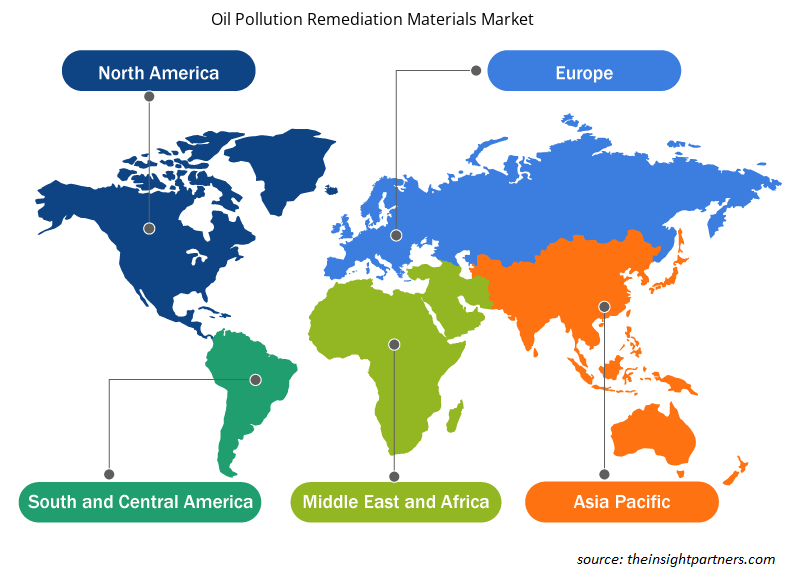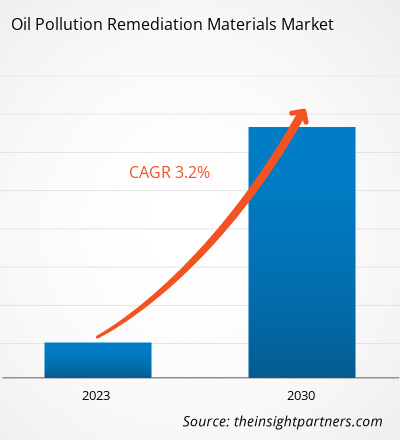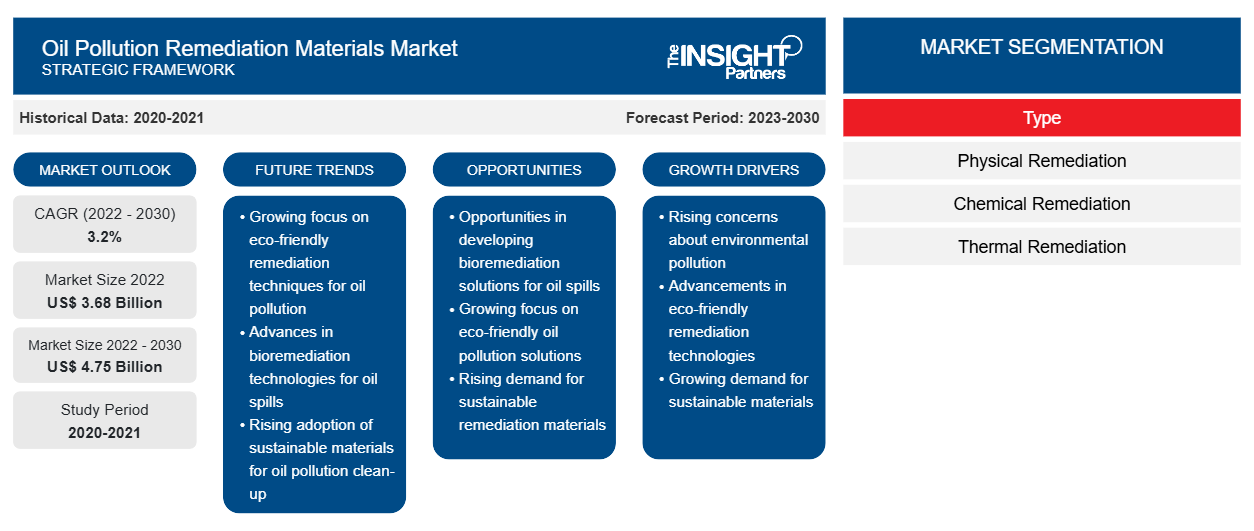[研究报告] 石油污染修复材料市场分析在2022年价值36.8436亿美元,预计到2030年将达到47.4956亿美元;预计2022年至2030年的复合年增长率为3.2%。
市场分析
石油污染修复材料用于降低全球范围内各种石油勘探、运输和工业运营活动对水体造成污染的高风险。修复技术主要分为物理修复、化学修复、热修复和生物修复。它们对于解决海洋石油泄漏问题极为重要。物理修复包括围油栏、撇油器和吸附剂等材料。化学修复材料包括分散剂和固化剂。
推动石油污染修复材料市场增长的主要因素是海上石油勘探和运输活动的增加以及与石油泄漏准备和响应相关的政府法规。过去几年中,各国政府都制定了石油泄漏清理法规,以确保迅速有效地应对环境紧急情况。这些法规通常概述了公司必须遵循的程序、技术和标准,以遏制、控制和清理石油泄漏。法规通常规定必须使用的修复材料类型,以最大限度地减少环境影响并确保有效清理。对有效石油泄漏清理的需求不断增长,推动了对修复材料的需求。
随着环境问题和法规的加强,人们越来越重视使用先进的环保材料进行修复。某些吸收剂、分散剂和屏障可能会被要求符合安全和功效标准,从而促进在石油泄漏应对工作中使用环保高效的材料。政府和石油行业都有准备计划,定期进行石油泄漏应对。政府要求及时处理石油泄漏,并尽量减少生态影响,这推动了对吸收剂、分散剂和其他修复材料的需求。2023 年,美国环境保护署根据联邦政府的国家应急计划 (NCP) 加强了标准,以改善美国水域和毗邻海岸线的石油泄漏应对工作。这些标准包括开发有效的石油泄漏修复产品,例如化学和生物制剂,并提供与使用这些产品相关的透明度和信息。
海上勘探和钻井活动的增加、通过管道或油轮运输石油以及石油开采和储存过程中的人为失误增加了发生漏油事件的可能性。根据国际能源署的数据,2021 年全球石油需求反弹,预计到 2025 年亚洲将占石油需求的 77%。预计到 2025 年亚洲的石油进口需求将超过每天 3100 万桶。亚太地区各国政府已启动石油项目,以满足该地区日益增长的石油需求。2023 年,马来西亚国家石油公司及其石油安排承包商报告了 19 个油气勘探发现和两次勘探评估成功,为马来西亚贡献了超过 10 亿桶油当量的新资源。这是过去几年加强勘探计划的结果,该计划共钻探了 25 口井。自 2015 年以来,这是单年钻探勘探井数量最多的一年。
增长动力与挑战
根据美国能源信息署2024年1月发布的报告,截至2024年1月9日,自新冠疫情爆发以来,美国原油产量有所增加,扭转了两年来的下滑趋势。美国原油产量从2021年的1127万桶/日上升至2023年的1321万桶/日,预计到2024年将达到1344万桶/日。根据加拿大能源监管机构的数据,加拿大生产的大部分原油通过西部省份的管道运输到美国、安大略省和魁北克省的炼油厂。根据布鲁盖尔AISBL 2023年发布的报告,俄罗斯是2021年全球五大能源生产国和消费国之一。同年,俄罗斯生产了5.952亿公吨原油,其中2.866亿公吨出口。因此,海上石油勘探和运输活动的增加推动了石油污染修复材料市场的发展。
定制此报告以满足您的需求
您可以免费定制任何报告,包括本报告的部分内容、国家级分析、Excel 数据包,以及为初创企业和大学提供优惠和折扣
-
获取此报告的关键市场趋势。这个免费样品将包括数据分析,从市场趋势到估计和预测。
石油污染修复材料市场区域洞察
Insight Partners 的分析师已详尽解释了预测期内影响石油污染修复材料市场的区域趋势和因素。本节还讨论了北美、欧洲、亚太地区、中东和非洲以及南美和中美洲的石油污染修复材料市场细分和地理位置。

- 获取石油污染修复材料市场的区域特定数据
石油污染修复材料市场报告范围
| 报告属性 | 细节 |
|---|---|
| 2022 年市场规模 | 36.8亿美元 |
| 2030 年的市场规模 | 47.5亿美元 |
| 全球复合年增长率(2022 - 2030 年) | 3.2% |
| 史料 | 2020-2021 |
| 预测期 | 2023-2030 |
| 涵盖的领域 |
按类型
|
| 覆盖地区和国家 |
北美
|
| 市场领导者和主要公司简介 |
|
石油污染修复材料市场参与者密度:了解其对业务动态的影响
石油污染修复材料市场正在快速增长,这得益于最终用户需求的不断增长,这些需求源于消费者偏好的不断变化、技术进步以及对产品优势的认识不断提高等因素。随着需求的增加,企业正在扩大其产品范围,进行创新以满足消费者的需求,并利用新兴趋势,从而进一步推动市场增长。
市场参与者密度是指在特定市场或行业内运营的企业或公司的分布情况。它表明在给定市场空间中,相对于其规模或总市场价值,有多少竞争对手(市场参与者)存在。
在石油污染修复材料市场运营的主要公司有:
- Sarva Bio Remed 有限责任公司
- 石油技术有限公司
免责声明:上面列出的公司没有按照任何特定顺序排列。

- 获取石油污染修复材料市场顶级关键参与者概述
竞争格局和重点公司
Sarva Bio Remed LLC、Oil Technics Ltd、Ansell Ltd、Oil-Dri Corp of America、Verde Environmental Group Ltd、Ecolab Inc、Cosco Shipping Heavy Industry Co Ltd、Regenesis、TOLSA SA 和 CL Solutions LLC 是石油污染修复材料市场报告中介绍的知名企业。此外,在研究过程中还研究和分析了其他几家企业,以全面了解市场及其生态系统。石油污染修复材料市场报告还包括公司定位和集中度,以评估竞争对手/市场参与者的表现。
行业发展和未来机遇
以下列举了石油污染修复材料市场的主要参与者所采取的举措:
2022 年 11 月,Ansell Ltd 在印度的绿地制造工厂投资约 8000 万美元。
- 历史分析(2 年)、基准年、预测(7 年)及复合年增长率
- PEST和SWOT分析
- 市场规模、价值/数量 - 全球、区域、国家
- 行业和竞争格局
- Excel 数据集
近期报告
相关报告
客户评价
购买理由
- 明智的决策
- 了解市场动态
- 竞争分析
- 客户洞察
- 市场预测
- 风险规避
- 战略规划
- 投资论证
- 识别新兴市场
- 优化营销策略
- 提升运营效率
- 顺应监管趋势























 获取免费样品 - 石油污染修复材料市场
获取免费样品 - 石油污染修复材料市场